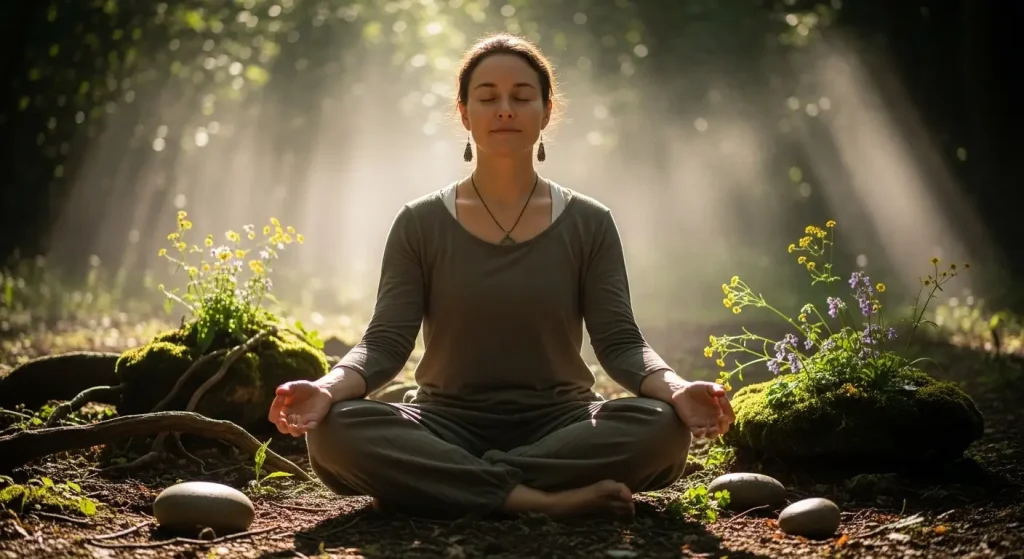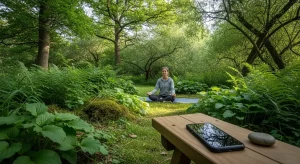In our fast-paced world, stress has become an unwelcome companion in our daily lives. Fortunately, mindfulness techniques offer a proven pathway to peace and mental clarity. These evidence-based practices can transform how you respond to life’s challenges, making stress reduction not just possible, but sustainable.
Research shows that Mindfulness-Based Stress Reduction (MBSR) and similar interventions have demonstrated efficacy in reducing anxiety and depression symptom severity, making these techniques invaluable tools for modern wellness.
Houseplants That Thrive Indoors: A Beginner’s Guide
Understanding Mindfulness and Its Role in Stress Management
Mindfulness is the practice of purposeful, non-judgmental awareness of the present moment. When applied to stress management, it helps break the cycle of rumination and worry that amplifies everyday tensions. In 2025, mindfulness is recognized as a leading approach for managing stress, enabling individuals to view stressors objectively and maintain composure during challenges.
The beauty of mindfulness techniques lies in their accessibility – you don’t need special equipment, extensive training, or significant time commitments to experience their benefits.
Essential Mindfulness Techniques for Daily Stress Reduction
1. Mindful Breathing: The Foundation of Stress Relief
Mindful breathing forms the cornerstone of most meditation practices. This simple yet powerful technique anchors your attention to the present moment while activating your body’s relaxation response.
How to Practice:
- Find a comfortable seated position
- Close your eyes or soften your gaze
- Focus attention on your natural breath rhythm
- When thoughts arise, gently return focus to breathing
- Practice for 5-10 minutes daily
Just 10 minutes of quiet, focused breathing can help anchor the mind and build resilience against stress, making this technique perfect for busy schedules.
2. Body Scan Meditation for Physical Tension Release
Body scan meditation is one of the most effective stress reduction techniques for releasing physical tension accumulated throughout the day. This practice increases body awareness while promoting deep relaxation.
Step-by-Step Process:
- Lie down comfortably with arms at your sides
- Begin with three deep breaths to center yourself
- Start at the top of your head, slowly scanning downward
- Notice sensations in each body part without trying to change them
- Breathe into areas of tension, allowing them to soften
- Complete the scan from head to toes over 15-20 minutes
3. Mindful Walking: Movement-Based Stress Management
Mindful walking combines gentle physical activity with meditative awareness, making it an excellent stress management technique for those who struggle with sitting meditation.
Practice Guidelines:
- Choose a quiet path 10-20 steps long
- Walk slower than normal pace
- Focus on foot sensations touching the ground
- Coordinate breathing with your steps
- When mind wanders, return attention to walking sensations
4. The 5-4-3-2-1 Grounding Technique
This mindfulness technique is particularly effective for acute stress or anxiety episodes. It engages your senses to bring immediate present-moment awareness.
Quick Reference:
- 5 things you can see around you
- 4 things you can physically touch
- 3 things you can hear right now
- 2 things you can smell
- 1 thing you can taste
Budget-Friendly Home Renovation Tips that Last
Advanced Mindfulness Practices for Deeper Stress Relief
Loving-Kindness Meditation for Emotional Regulation
This meditation practice cultivates compassion while reducing stress-related negative emotions. Regular practice can significantly improve your relationship with difficult emotions and challenging situations.
Mindful Eating: Transforming Meals into Meditation
Daily mindfulness can extend to eating habits, transforming meals into opportunities for stress relief and present-moment awareness. This practice also promotes better digestion and healthier eating patterns.
Implementation Tips:
- Eat without distractions (phones, TV, books)
- Chew slowly and mindfully
- Notice flavors, textures, and aromas
- Pay attention to hunger and fullness cues
- Express gratitude for your food
Creating Your Personal Mindfulness Routine
Morning Mindfulness Rituals
Starting your day with mindfulness techniques sets a calm, centered tone that can influence your entire day’s stress levels.
Suggested Morning Practice:
- 5 minutes mindful breathing upon waking
- Mindful tooth brushing or shower
- Setting daily intentions
- Gratitude reflection
Evening Stress Release Practices
End your day by processing stress through meditation practices that promote restful sleep and emotional balance.
Evening Routine Elements:
- Body scan meditation before bed
- Journaling about daily experiences
- Progressive muscle relaxation
- Loving-kindness practice for difficult relationships
10 Timeless Fashion Staples Every Wardrobe Needs
Overcoming Common Mindfulness Challenges
Many beginners struggle with implementing mindfulness techniques consistently. Here are practical solutions to common obstacles:
“I Don’t Have Time”
Solution: Start with micro-practices – 2-3 minutes of mindful breathing while coffee brews or during commute breaks.
“My Mind Won’t Stop Racing”
Solution: Racing thoughts are normal. The practice isn’t stopping thoughts but changing your relationship with them.
“I Don’t Feel Different”
Solution: Stress reduction benefits accumulate gradually. Track your progress with mood journals or stress level ratings.
The Science Behind Mindfulness and Stress Reduction
Research consistently demonstrates that regular mindfulness meditation creates measurable changes in brain structure and function. These neuroplastic changes enhance emotional regulation, reduce cortisol levels, and improve overall resilience to stress.
Studies show that participants who practice mindfulness techniques regularly experience:
- Reduced anxiety and depression symptoms
- Improved sleep quality
- Better immune system function
- Enhanced focus and cognitive flexibility
- Lower blood pressure and heart rate
Newborn Care 101: Essential Tips for First-Time Parents
FAQ Section
How long does it take to see results from mindfulness techniques?
Most people notice initial benefits from mindfulness techniques within 2-3 weeks of consistent practice. However, stress reduction effects can be felt immediately after a single session. For lasting changes in stress reactivity, research suggests 8 weeks of regular meditation practices produces significant improvements in stress management and overall well-being.
Can mindfulness replace therapy for anxiety and stress?
While mindfulness meditation is highly effective for stress management, it works best as a complementary approach rather than a replacement for professional treatment. Daily mindfulness practices can enhance therapy outcomes and provide valuable self-help tools, but severe anxiety or chronic stress may require professional guidance alongside mindfulness techniques.
What’s the difference between meditation and mindfulness?
Mindfulness is a state of awareness that can be practiced throughout daily activities, while meditation practices are formal, dedicated periods of training the mind. Mindful breathing can happen while washing dishes or walking, whereas meditation typically involves setting aside specific time for focused practice. Both approaches support stress reduction and can be combined effectively.
How often should I practice mindfulness for stress relief?
For optimal stress reduction benefits, aim for daily mindfulness techniques even if just for 5-10 minutes. Consistency matters more than duration – practicing mindful breathing for 5 minutes daily is more beneficial than one 60-minute session weekly. Many practitioners find that incorporating daily mindfulness into existing routines (meals, commuting, bedtime) makes consistency easier to maintain.
Can children learn mindfulness techniques for stress?
Absolutely! Mindfulness techniques are highly beneficial for children and teenagers dealing with academic stress, social pressures, and emotional challenges. Simple practices like mindful breathing, body awareness games, and sensory exercises can be adapted for younger practitioners. Many schools now incorporate stress management curricula that include age-appropriate meditation practices.
Investing 101: A Beginner’s Guide to the Stock Market
Transform Your Relationship with Stress Today
Mindfulness techniques offer a scientifically-backed pathway to greater peace, resilience, and emotional well-being. By incorporating these stress reduction practices into your daily routine, you’re investing in your long-term mental health and quality of life.
Remember, developing mindfulness meditation skills is like building physical fitness – it requires patience, consistency, and self-compassion. Start small, be consistent, and trust the process as these powerful stress management tools gradually transform your relationship with life’s inevitable challenges.
Ready to begin your mindfulness journey? Discover our comprehensive guide to meditation practices and daily mindfulness techniques that can help you build lasting stress resilience:
Meditation & Mindfulness Apps ( Free) :
Aromatherapy & Essential Oils:










